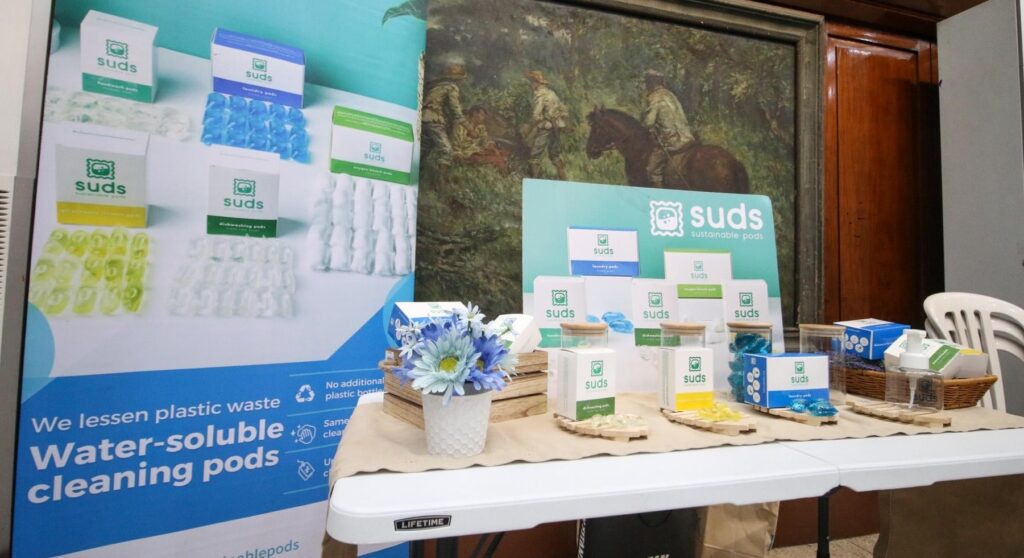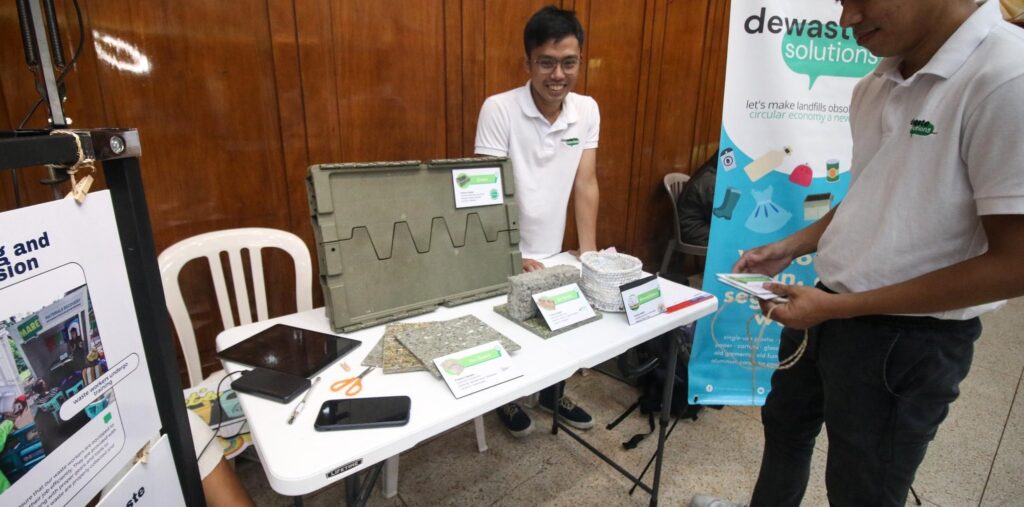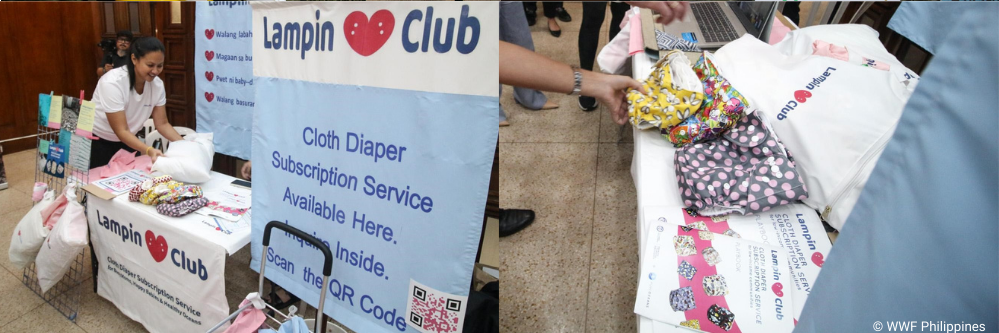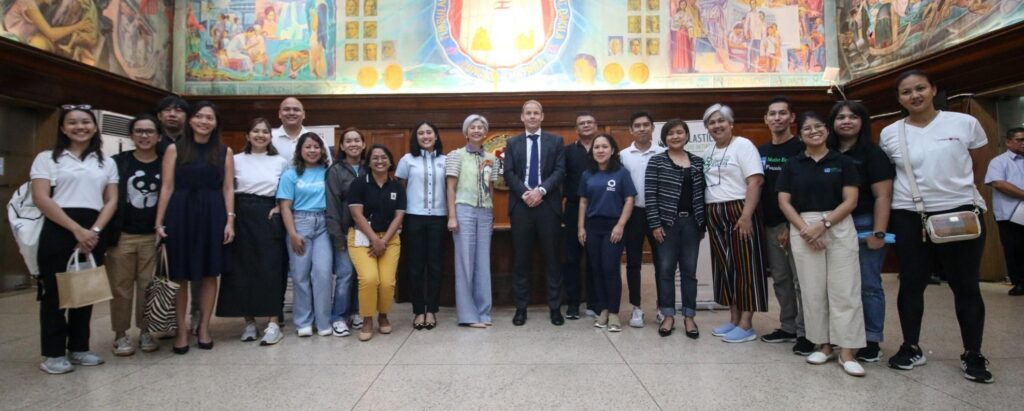In a bid to combat plastic pollution, Manila is launching a year-long initiative with seven groundbreaking solutions. Developed by local organizations and social enterprises, these projects aim to cut plastic waste leakage by 30%, addressing both private and public sector concerns.
Suds Sustainable Pods: Cleaning Without the Waste

The surge in demand for household and personal care products during the pandemic has amplified plastic pollution. Suds Sustainable Pods steps in with a game-changing solution. Offering a diverse line of concentrated cleaning essential pods in biodegradable, non-toxic, and waste-free water-soluble film, Suds Sustainable Pods aims to eliminate unnecessary plastic packaging while meeting the hygiene needs of Filipino households.
Green Space: Transforming Commercial Waste into Healthy Soil

Commercial establishments in Metro Manila generate 515,258 kilograms of waste. Of this waste, 56% is biodegradable, with 52% being food waste. The Soilmate Project aims to empower commercial establishments to transition to a circular economy approach through composting, diverting unavoidable organic wastes from landfills. This effort not only reduces greenhouse gas emissions but also contributes to the production of healthy soil.
The SoilMate App, a project by Green Space and WWF-Philippines, provides access to Green Space’s Book-a-Bucket subscription composting service. This service helps divert food waste from landfills, to introduce composting as a natural part of daily life in every home, office, and kitchen.
Dewaste Solutions: Modular Waste Management for Every Barangay

Out of the 42,000 barangays in the Philippines, only 9,800 have Material Recovery Facilities (MRFs) (Senate, 2017), and merely 3,600 are currently operational (DENR, 2018) In Manila City alone, there are only about 11 operational MRFs, out of its 896 barangays. Many barangays lack the necessary infrastructure to effectively manage their waste, leading to instances of waste leakage. The primary reasons for this issue include weak policy implementation, a lack of awareness and motivation among residents, and lack of adequate facilities such as functioning MRFs.
Introducing MARE!, a modular and portable kiosk designed to adapt to any vacant space within a community. This portable and modular MRF functions as both a waste collection point and an education hub. Additionally, it serves as an exhibit showcasing products derived from waste. The key advantage of MARE! lies in its ease of assembly, cost-effectiveness, and its construction using recycled materials, contributing to raising awareness about waste management.
Lampin Club: Sustainable Diapering for a Healthier Ocean

Diapers entangled around coral are a common sight for fisherfolk divers and snorkelers in the Philippines. Research indicates that coral entwined with plastic has a 20-fold higher chance of acquiring diseases. With an estimated 3 million diapers discarded daily in the Philippines, where approximately 20% of all plastic waste ends up in the ocean, the environmental impact is significant. In a baby’s first year alone, they can use between 2,000 to 3,000 disposable diapers.
To address this issue, the Lampin Club has introduced a cloth diaper subscription service, providing a sustainable and eco-conscious choice for busy moms who want to prioritize the health of oceans. This subscription service aims to make eco-friendly diapering a practical and daily option for modern moms. The process involves individuals registering as members, selecting their preferred plan, receiving a membership kit from the Lampin Club, and enjoying free daily deliveries of cloth diapers. This initiative not only benefits the well-being of babies but also contributes to a healthier marine environment.
Mother Earth Foundation: Nurturing Plastic-Free Business Practices

The “Turo at Tingi” project aims to assist small and medium-sized enterprises (SMEs), specifically barangay micro-business enterprises (BMBEs) such as carinderias and sari-sari neighborhood stores, in transitioning away from the so-called “sachet economy.” This economic model perpetuates dependence on single-use plastics (SUPs), and the project’s goal is to return to a plastic-free environment. To achieve this objective, there needs to be a conducive environment with appropriate systems and policies for SUP reduction. Additionally, funding and support mechanisms must be available and accessible for both existing and prospective Zero Waste (ZW) businesses, along with plastic reduction programs and Zero Waste training and education incorporating the concepts of refill and reuse in modular courses and curriculum development.
To create these necessary conditions, Mother Earth Foundation’s (MEF) interventions will include Green Profiling (data updating), Information and Education Campaigns (IECs), Systems and Policy dialogues, Mobilizations, Zero Waste Academy (ZWA) training sessions, Multi-sectoral consultations, and the transformation and operation of pilot Zero Waste businesses. Through these comprehensive initiatives, the “Turo at Tingi” project aims to instill sustainable practices, reduce plastic usage, and promote a culture of refill and reuse in businesses within the community.
Ecowaste Coalition: A Holistic Approach to Zero Waste Barangays

Ecowaste Coalition’s goal is for local barangays to adopt zero waste as a viable and sustainable approach to addressing municipal solid waste management, thereby reducing plastic pollution in local environments. Using a multi-level, integrated community-based systems approach, the project aims to enhance the effectiveness of local governments and the private sector in reducing plastic pollution in marine environments. It also seeks to raise awareness of the impact of plastic pollution and increase opportunities for economic development to mitigate plastic pollution in marine environments.
The main objectives and activities of the project include the following: a) local governments in the target barangays in the City of Manila adopting improved ESWM plans, b) community stakeholders and households in the target barangay in the City of Manila adopting improved solid waste management practices toward zero waste, and c) organizing, training, and implementing improved market-based solutions toward zero waste by recycling groups in the target barangay.
Plastic Bank: Social Recycling for a Greener Manila

Their project, aptly titled “Building a Greener Manila: Upgraded Collection System & Community Education (B-MUSE) Project,” is poised to emerge as a significant local initiative. Its primary objective is to tackle the global challenge of plastic waste pollution and its detrimental impact on the environment and disadvantaged communities. These communities, often located in close proximity to landfills and coastal areas, bear a disproportionate burden due to limited social safeguards, inadequate support structures, and their reliance on natural resources. Additionally, these regions are frequently affected by both natural and human-made disasters, such as floods and landslides, resulting in severe health, safety, and economic consequences.
In alignment with WWF’s Waste Worker Program’s Strategic Objective, this project aims to “Reduce plastic pollution in Manila by preventing the further descent into extreme poverty of highly vulnerable communities.” Among those most adversely affected by inadequate plastic waste management are waste collectors, often informal laborers critical to recycling and waste management. Unfortunately, these individuals frequently face significant health and safety risks, working under precarious, low-paying conditions without access to social benefits or occupational health and safety measures.
Plastic Bank presents a solution to this predicament through its well-established and scalable business model, known as Social Recycling. The primary goal is to enhance the involvement of informal waste pickers, especially women, by 50%, reaching a total of 1,743 individuals. Additionally, the project aims to add 100 new active members, bringing the total to 870, and establish 20 new partner branches, resulting in a total of 93 partner branches. Through these initiatives, the project envisions not only reducing plastic pollution but also improving the livelihoods and working conditions of informal waste collectors in Manila.

All seven solution providers presented their initiatives to Manila City Mayor Hon. Honey Lacuna-Pangan and Norwegian Ambassador H.E. Christian Halaas Lyster on September 19, 2023, at the Manila City Hall.
This launch event marked a step in raising awareness and garnering support for these innovative projects aimed at reducing plastic and food waste in the City of Manila. The booths set up during the event provided an overview of each pilot proposal, ensuring that the city is well-informed about the efforts underway to address plastic pollution. As these initiatives take root, they hold the promise of transforming Manila into a model city for sustainable waste management and environmental stewardship.


